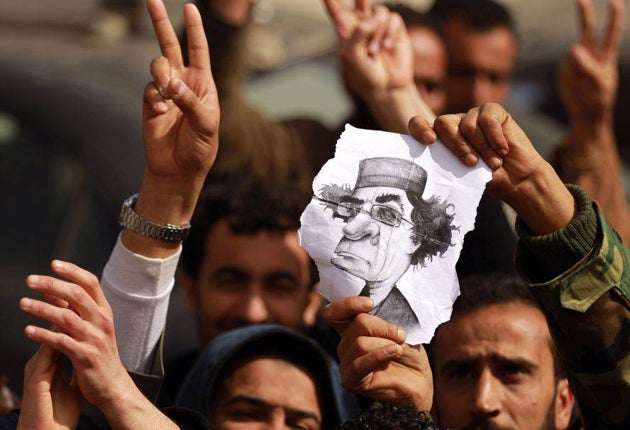Libyan Colonel: 'The people are running the city and the army is with the people'
Catrina Stewart reports from Tobruk, where victorious protesters are working to restore a sense of normality

Protesters still giddy with success at routing Libyan forces crowd the entrance of Tobruk's central police station, which they set ablaze just a few days ago. Burnt-out police cars are strewn in a back courtyard, while some of the demonstrators run through darkened corridors made treacherous by falling plaster and other debris.
Outside, people chant slogans against Colonel Muammar Gaddafi, the reviled Libyan leader they accuse of turning on his own people with vicious force.
"Who thinks he is a lion, and points to us as rats?" one placard says, a reference to Colonel Gaddafi's defiant speech a few days earlier, when he refused to step down. Like many parts of Libya, the north-eastern seaside city of Tobruk is now in the hands of protesters and the military, which has defected en masse. But as the initial euphoria subsides, the task now is to re-establish some semblance of order and prevent the country from plunging into a bloody and protracted civil war.
Protesters have formed civilian committees tasked with restoring some normality to Tobruk. More than 20 groups are charged with securing key installations, distributing food, collecting looted weapons, helping businesses reopen and much more.
At the helm is General Suleiman Mahmoud, a former army loyalist who defected to the opposition after seeing the carnage wrought by Colonel Gaddafi's forces in Benghazi, the biggest city in eastern Libya.
"The people are running this city, and the army is with the people right now," Colonel Rashid al-Seinini, a senior army officer in Tobruk, told reporters. "Whatever the people want, the army is doing."
On the outskirts, the committees have bolstered the guard at the city's only oil refinery, helping thwart what they believe was a plan by pro-Gaddafi thugs to attack the facility two days ago. They have also suspended oil exports, partly because the regime could try to bomb the refineries, they say, but also over fears that the revenue would end up in Colonel Gaddafi's pockets.
Other committees are working with émigrés in neighbouring Egypt to bring in medical and food supplies, while banks reopened for the first time yesterday since the protests began. Radio Free Libya, a local station, has appealed to protesters to return the weapons seized from the police during the clashes last week. About 90 per cent of the weapons – mostly rocket-propelled grenades and Kalashnikov rifles – have been returned, Abubakir Hussein Zaki, a prominent dissident, said. These are now being redistributed to security guards and the military in preparation for defending against a new crackdown.
Whether the committees will form the basis of a future civil government in the event of Colonel Gaddafi's fall is still unclear. They claim they are not yet thinking of organising themselves politically, only of ridding the country of Colonel Gaddafi. "In our mind, there is nothing else right now – our only wish is to see this criminal out of the country," said Hassan Abdel Rafig, a committee leader.
Mass defections and territorial gains by anti-regime protesters have left the regime teetering. Colonel Ahmed Ashur Eshbis, a former intelligence officer, joined the opposition two days ago.
Protesters believe it is only a matter of time until the regime crumbles, but fear more bloodshed is to come.
Subscribe to Independent Premium to bookmark this article
Want to bookmark your favourite articles and stories to read or reference later? Start your Independent Premium subscription today.

Join our commenting forum
Join thought-provoking conversations, follow other Independent readers and see their replies